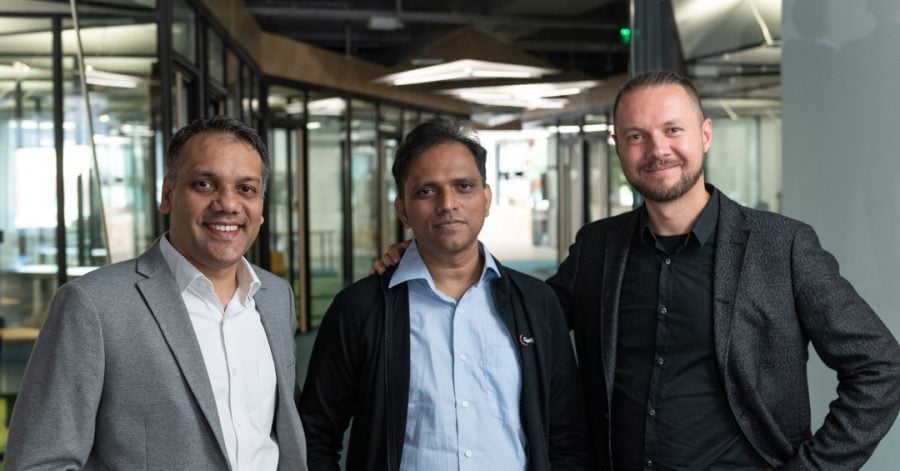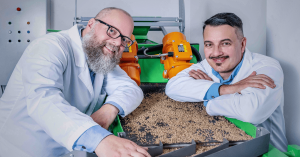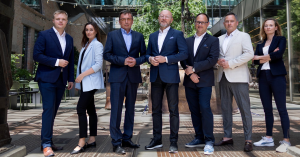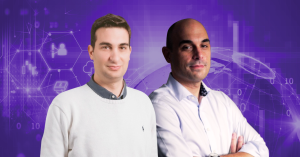CleverTap and Leanplum announced that they will be joining forces with the goal to build one of the world’s most powerful data engines for customer engagement and retention marketing. This acquisition deal is of great importance for the Bulgarian startup ecosystem as the local office is expected to become a main R&D hub for the new entity.
To learn more about what’s next, how this partnership came to life, and what will be the impact on the office in Sofia, we talked to Momchil Kyurkchiev, co-founder of Leanplum and now Chief Strategy Officer at CleverTap; Anand Jain, co-founder and CPO of CleverTap; and Suresh Kondamudi, co-founder and CTO of CleverTap.
What’s the story behind CleverTap’s acquisition of Leanplum? Why now?
Momchil Kyurkchiev: The intro happened through one of our board members but a few months back, we used to be pretty fierce competitors. I remember our first meeting, we were thinking: “What do we tell them? What do we not tell them?” We didn’t want to reveal too much.
But it turned out that the more we got to know each other, the more things actually started to click. It was almost like two different pieces of a jigsaw puzzle that fit together. We realized there’s so much to compliment in terms of geography because, you know, Leanplum is really strong in the US and Europe. While CleverTap really owns a big part of the rest of the world – India, Southeast Asia, Latin America, and the Middle East.
We also complement each other when it comes to the verticals we focus on. We’re really good at gaming and subscription apps. And CleverTap is a market leader in industries like fintech, media, and food delivery.
Last but not least, we actually have very similar cultures in a very rare way. In a lot of deals, people always complain, “our culture got destroyed”. But like everything else I’ve seen so far, the core values of our two companies are very similar.
Anand Jain: In addition, I don’t think this is like a buyer and a seller kind of equation. Building on what Momchil said, if you put the products and the markets of the two companies together, you have a winning combination. It’s not like we were looking to buy a new business.
But we realized that if we joined forces, we could change the trajectory of both companies. It’s 1 plus 1 becomes 11. So, we think of this as a partnership, a very strong partnership.
Will Leanplum remain as a separate product and brand or become part of CleverTap?
Suresh Kondamudi: The Leanplum product and features will be imported into the CleverTap platform, making our offering very strong.
Thankfully, we have some bit of overlap, so we plan to complete the migration in the span of 12-15 months. Of course, we will make sure the transition is as seamless as possible for customers.
Anand Jain: But we will also keep the Leanplum brand because of the strength it offers in verticals like gaming.
What will change and hopefully be better for your customers now?
Momchil: I am super impressed with CleverTap’s data engine. It’s a homegrown engine purpose-built for what we do, which is mobile engagement.
The reason I was impressed with it is that oftentimes when you look at technology companies, you have one of two strategies.
You’re either trying to build something that’s super powerful and flexible or you can try to be the cost-effective solution in the market. So, I was shocked to see these guys have actually gotten both at the same time – it’s very rare. The only way to do that is with real innovation.
One other example I can think of like that is Tesla – they have truly innovated in the electric vehicles segment. They have both the cheapest batteries and also the most powerful longest-range vehicles. And they’re 5 to 10 years ahead of every competitor.
So, I think that’s probably the most important thing that I’m really excited about – to be able to bring that kind of data engine power and cost efficiency to our customers.
Because at the end of the day while we’re a marketing platform, we’re essentially a data platform. Everything runs through data, all the personalization, all the messages, the timing, relevance, everything is being computed on the fly in real-time. It’s an enormous data crunching problem. So, having that kind of advantage is a sustainable advantage, first of all, and second of all, I think it’s going to be pretty exciting for customers.
Anand: If you’re not trying to build a better email solution, or you know, just send more notifications to the world, you’re actually trying to solve the data problem.
So for the first 30 months of our startup’s life, we were busy, the three founders building the core technology from scratch, it took us that long. We were thinking from first principles, and we came up with our solution, knowing that this is not about email, this is not about push notifications.
It’s about knowing people and how you can leverage that data for insights for segmentation, personalization, messages, recommendations, and so on.
For us, to be able to personalize, it is not just about having the data, but also making it available in real-time. At a phenomenal scale, think of 400 million monthly active users scale, that’s an incredible scale.
Momchil: If I take the Tesla analogy even further, I think the reason Tesla’s been so successful against the legacy car manufacturers is exactly that they think through first principles. If I have to start from scratch, how would I build this? That’s how you really innovate. I see the same opportunity to disrupt the entire marketing tech space with this kind of approach.
What would success look like for both of you in the next 12-18 months? How much do you want to grow?
Anand: We are very ambitious. So, we’re on track to have $100m in ARR between CleverTap and Leanplum by the end of 2022. In the next five years, we want to get to 10x of that.
More broadly, we want to have very happy teams. That means making sure that they’re working on the challenging problem and solving for what is going to come next. Then, we make our customers happy – with the combined product capabilities, they can do a lot more, and they can personalize a lot more deeply. Happy investors is an outcome of that.
Momchil: What really gets me excited is the holy grail problem of marketing technology – the problem we’re trying to solve, which is how do you deliver individualized personalized communication that doesn’t feel like spam, but it’s actually personalized.
This has not been solved for over 40 years. We’ve gotten better at it but we still haven’t solved the data problem, and the predictive element to it and being able to build this contextual model for every single individual and to truly, truly drive engagement retention in a way that is at the scale of billions of people around the world.
Would you be brave enough to give us some sort of timeline for the solution to this data problem?
Anand: First of all, I think of this as a continuous problem, right? Let’s look at search engines, first-generation. There were obscure names like AltaVista, then came better search engines, like Yahoo which was considerably better than the previous one. And then came Google and Google is still improving its search capabilities. So, it’s a continuous refinement, there is no end date for this. It means that as newer form factors emerge, like now maybe smart glasses, watches, etc., you will have to like figure out even more ways to personalize what goes on the watch and what shows up on the glasses. Some of these become exponentially more interesting problems, but also exponentially harder to solve. But that’s what keeps me excited about this.
On the question of the timeline, I’ll give you a 10-year roadmap, to be honest.
Momchil: Yeah, I was gonna say that to me it’s also like a ten-year vision. Right now, we still don’t have many connected devices besides mobile phones. But if we connect everything, and it builds a true context for you, then all of a sudden, we have a lot more data. So, we’d need an engine that can scale with a tremendous amount of data in real-time.
What will be the impact of this deal on the office in Bulgaria?
Momchil: Well, obviously, we will be growing the office in Sofia. We aim for a 20% increase by the end of 2022.
It’s kind of unique what we can offer to the market – there aren’t really any other startups that have engineering problems at this scale. That’s truly the internet scale.
When I talk to our engineers, what gets them really, really excited It is solving really hard problems.
I worked at Google, I remember Google scale problems, right? Everybody wanted to work on that kind of thing. And we don’t have Google or Facebook in Bulgaria, but we will have CleverTap and Leanplum in Bulgaria.
What kind of people would succeed in CleverTap and Leanplum.. first principle thinkers. Anything else?
Anand: Yeah, you need to be you need a first principles thinker. We need people who don’t come with too much dogma – who don’t say something it’s impossible to build. We’re constantly solving problems for the first time.
What’s the number one reason why engineers should come and join the CleverTap/ Leanplum team in Sofia?
Suresh: As mentioned earlier, we deal with data crunching at an extreme scale. What it means for engineers is that they get to work on really challenging problems. Those who love deep computer science would love to work on a technology like this. At the end of the day, engineers want to solve interesting problems and create a meaningful impact.
How do you plan to bring the teams in Sofia and Mumbai, together in terms of culture?
Suresh: Thankfully and surprisingly, I see significant overlap in terms of culture. If you look at my team in Mumbai and other places in the US when I look at the team here, I almost feel at home, I feel like I’m talking to my own team. We brainstorm problems and stuff. I think humility is an important fundamental building block for all of us. And I see that being exhibited in this office and in the Leanplum teams.
Of course, all the teams will go through an onboarding process and get to know each other better. But it looks like this is not going to be a challenge for us. I am pretty sure that both the teams would walk towards one cause as one team with one goal very soon.
Momchil, you co-founded Leanplum 10 years ago – what was your ambition back then and how did it evolve over the years – did you expect the company to grow so much?
Momchil: Honestly, my first ambition was to raise a seed round. I had never done a startup before. So, here we are 10 years later, you know, way beyond what I expected. Obviously, our vision developed and you know, we’ve always been excited about building marketing technology, but with me being a Bulgarian I also have this dual mission.
So, I always felt like my secondary mission was also to be able to establish a really cool company in Sofia, which is building a world-class product and serving markets all over the world.
I felt like we can inspire people in Bulgaria and show them that this is possible.
Silicon Valley didn’t start with just a bunch of startups getting funded. There’s something called a flywheel effect.
Some companies got acquired, some of the people started their own or moved on to other things, and then kind of cross-pollinated. And then there was a whole community. I think this is actually pretty important.
With CleverTap, we’re not an early-stage startup anymore, we’re a much more substantial company with about 600 employees. And this is a different role for us in the ecosystem in Sofia. But at the same time, it’s, it’s also a way to kind of fulfill in a bigger way, our mission to build a stronger ecosystem startup ecosystem here.








